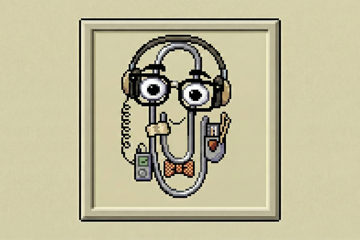 Pumarosa
Pumarosa"Getting a little bit overwhelmed is good," says Isabel Munoz-Newsome, singer/guitarist of London quintet Pumarosa. She's talking about being on stage, and those moments where things either go wrong or oh so right, and she's lost in her band's spectral, psychedelic alt-rock. "I had this really bad jetlag yesterday; this weird feeling like I was in an elevator, like blood was rushing up and down my body. And sometimes, when I dance [on stage], I just spin and spin and spin. And, playing last night, I thought: 'I really shouldn't do this, I'm dizzy already.' But I did it anyway, and I was staggering around. I enjoyed - for a moment - not being in control."
The day after playing a sold-out show in Melbourne, Pumarosa - Munoz-Newsome, drummer Nick Owen, guitarist Jamie Neville, bassist Henry Brown, keyboardist/saxophonist Tomoya Suzuki - have just finished their cover shoot for The Music. In the studio space, strewn with spotlights, reflectors, and drop-sheets, the outside world is far away. But the highlight of their first Australian tour has been time spent in the outdoors; stepping off an overnight flight and heading for a swim at Coogee Bay.
"It's been really wonderful," admits Owen. "Because on a rainy day in North America, where you're only stopping at service stations, and the only food you can find is totally processed, touring is pretty bleak."
Pumarosa's first Australian tour has been a particular tonic for Neville, who, like so many Englishmen before him, came out here as an 18-year-old on a gap year. He ended up collecting money door-to-door in the far-flung Sydney suburbs for "a really fucked up company, just the worst people". "So," Neville says, "it's been so nice coming back, because last time I was here I was just really depressed."
Don't miss a beat with our FREE daily newsletter
Suzuki, the band's "natural adventurer", is keen to see whatever he can. He's got a million stories: working in a nature reserve in the Ecuadorian rainforest at 19 ("tracking monkeys for scientists and studying orchids"). Showing up at a UK festival with a "saxophone and a passport", leading to an odyssey of hitching throughout Europe, from Barcelona to a "psy-trance" rave outside of Budapest. Spontaneously leaving a Romanian festival to travel for two months with "11 crusty hippies" through former Yugoslavia down into Turkey, and driving around Morocco for months "picking up hitch-hikers".
"Because Australia is such a beautiful place, you must have this next-level colonial guilt; like you're living in a stolen paradise."
The band are engaging conversationalists, equally capable of talking about Brexit or Australian colonial identity, "Because Australia is such a beautiful place," Neville thinks, "you must have this next-level colonial guilt; like you're living in a stolen paradise." They touch on the migration of populations to cities and of daily life to social media. They broach Sydney lockout laws: "When you're touring," says Suzuki, "what stands out the most are these strange little regulations you have in different places; like, I was so confused by all the rules in Sydney about drinking." When it comes to talking about their band, though, Pumarosa can find it hard to find the right words.
"When you're in band - performing music that you've made, words that you've written - everything feels so on the line. Every word I sing, every gesture I make, it's all me," says Munoz-Newsome. "But, just like it can be hard to describe yourself to people, it can be hard to describe your band. I find doing the social media really hard because it's so self-conscious and self-referential. And for me, the moment of being creative is the opposite of that. When something is coming out, is being imagined, it's very personal and very pure. [Once] the label asked me if I could take photos or make a video of me working on the album artwork. And I was like, 'No! No way! I really can't do that!' The act of making art, being honest in that moment, that's quite frightening and quite sacred. To have that just be, like, Snapchatted, it's just wrong."
"Making music," says Neville, "you're in the middle of a process that is completely freeing. We often have this collective, unspoken idea that we all just instinctively understand, and it will reveal itself to you as you're doing it... We all just come together, in the one room - there's no writing on a computer, building things or swapping files - and smash our ideas together, force something out of it. It's very tactile."
"We're reacting to sounds, following them, as much as ideas," Owen offers. "Like Sonic Youth, I think we're often working with the energy of the guitar."
"I think we have a Sonic Youth-esque mentality: make pop music, but do it with a kind of anarchic tonality," Neville furthers. "I would definitely define it as pop music: we're not avant-garde, we make songs. But, within that, there's lots of different perceptions. Some people might just look at us as straight pop, someone else would think our songs are all too long and difficult."
"I think the fact that our songs are very long, and the words are quite dense, is a kind of response against that [digital] climate," says Munoz-Newsome. "We're not providing that instantaneous, bite-sized content. We'd hope people would be happy that we're offering something that exists outside of that."
Growing up Munoz-Newsome never saw herself being in this position. Not just as the face of a budding buzz-band, but even making music. "I wasn't writing songs when I was a kid," she says. "I didn't want to be in a band at all. It never even occurred to me. And then it just happened."
"I think we have a Sonic Youth-esque mentality: make pop music, but do it with a kind of anarchic tonality."
Of course, Pumarosa didn't just happen. After studying visual art and painting and thinking that she'd find work as a scenographer, Munoz-Newsome was drawn onto the stage, first as a participant in performance art works. She began writing her first songs eight years ago, and spent years working on them, first just with Owen, then with the band as they slowly came together. Their debut single Priestess finally came out in 2015, and now their debut LP The Witch is here.
The album strings the band's long songs - none are less than four minutes, four are more than six - together; moving from the "very subdued" opener Dragonfly through to the "really mental, high energy" closer Snake. "Moving from this cinematic opener, that sets the mood, then building up towards this crazy, psychedelic-Hare Krishna climax," Munoz-Newsome says, "it feels like a journey, more than a set of songs maximising their position for streaming services. We liked the way that felt. But maybe that's a bad idea, marketing-wise."
"Finishing an album," says Owen, "you've planted a flag, marked out this territory. After years of work you can finally say: this is a finished work, this represents us."
As to just how it represents them, Pumarosa still aren't sure. "We all have particularly different viewpoints, and there can be conflict in that," says Suzuki. "I like that. If everyone agreed, it would just feel too safe. We're not a single genre idea or a singular sound. You can listen to techno, or folk music from Africa, and connect those ideas, and draw influence from anywhere along that line. Everything is on the table."
"Anything goes," says Munoz-Newsome, "as long as you do it wholeheartedly. The worst thing you can do is fake it."















